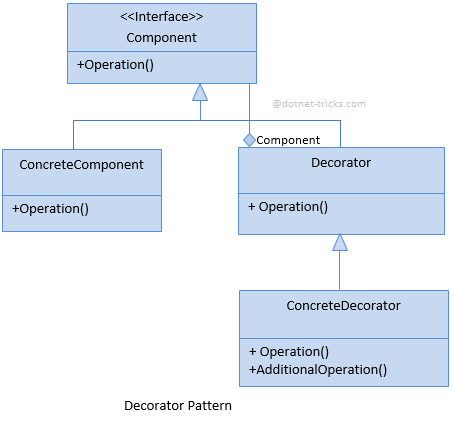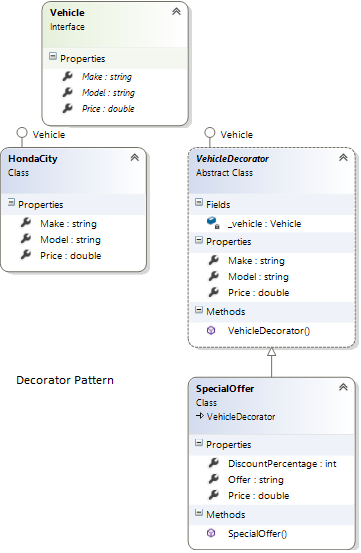Decorator design pattern falls under Structural Pattern of Gang of Four (GOF) Design Patterns in .Net. Decorator pattern is used to add new functionality to an existing object without changing its structure. Hence Decorator pattern provides an alternative way to inheritance for modifying the behavior of an object. In this article, I would like to share what is decorator pattern and how is it work?
The decorator pattern is used to add new functionality to an existing object without changing its structure.
This pattern creates a decorator class which wraps the original class and add new behaviors/operations to an object at run-time.
The UML class diagram for the implementation of the decorator design pattern is given below:

The classes, interfaces, and objects in the above UML class diagram are as follows:
This is an interface containing members that will be implemented by ConcreteClass and Decorator.
This is a class which implements the Component interface.
This is an abstract class which implements the Component interface and contains the reference to a Component instance. This class also acts as base class for all decorators for components.
This is a class which inherits from Decorator class and provides a decorator for components.
public interface Component
{
void Operation();
}
public class ConcreteComponent : Component
{
public void Operation()
{
Console.WriteLine("Component Operation");
}
}
public abstract class Decorator : Component
{
private Component _component;
public Decorator(Component component)
{
_component = component;
}
public virtual void Operation()
{
_component.Operation();
}
}
public class ConcreteDecorator : Decorator
{
public ConcreteDecorator(Component component) : base(component) { }
public override void Operation()
{
base.Operation();
Console.WriteLine("Override Decorator Operation");
}
}

The classes, interfaces, and objects in the above class diagram can be identified as follows:
Vehicle - Component Interface.
HondaCity- ConcreteComponent class.
VehicleDecorator- Decorator Class.
Special Offer- ConcreteDecorator class.
/// <summary>
/// The 'Component' interface
/// </summary>
public interface Vehicle
{
string Make { get; }
string Model { get; }
double Price { get; }
}
/// <summary>
/// The 'ConcreteComponent' class
/// </summary>
public class HondaCity : Vehicle
{
public string Make
{
get { return "HondaCity"; }
}
public string Model
{
get { return "CNG"; }
}
public double Price
{
get { return 1000000; }
}
}
/// <summary>
/// The 'Decorator' abstract class
/// </summary>
public abstract class VehicleDecorator : Vehicle
{
private Vehicle _vehicle;
public VehicleDecorator(Vehicle vehicle)
{
_vehicle = vehicle;
}
public string Make
{
get { return _vehicle.Make; }
}
public string Model
{
get { return _vehicle.Model; }
}
public double Price
{
get { return _vehicle.Price; }
}
}
/// <summary>
/// The 'ConcreteDecorator' class
/// </summary>
public class SpecialOffer : VehicleDecorator
{
public SpecialOffer(Vehicle vehicle) : base(vehicle) { }
public int DiscountPercentage { get; set; }
public string Offer { get; set; }
public double Price
{
get
{
double price = base.Price;
int percentage = 100 - DiscountPercentage;
return Math.Round((price * percentage) / 100, 2);
}
}
}
/// <summary>
/// Decorator Pattern Demo
/// </summary>
class Program
{
static void Main(string[] args)
{
// Basic vehicle
HondaCity car = new HondaCity();
Console.WriteLine("Honda City base price are : {0}", car.Price);
// Special offer
SpecialOffer offer = new SpecialOffer(car);
offer.DiscountPercentage = 25;
offer.Offer = "25 % discount";
Console.WriteLine("{1} @ Diwali Special Offer and price are : {0} ", offer.Price, offer.Offer);
Console.ReadKey();
}
}

Add additional state or behavior to an object dynamically.
Make changes to some objects in a class without affecting others.